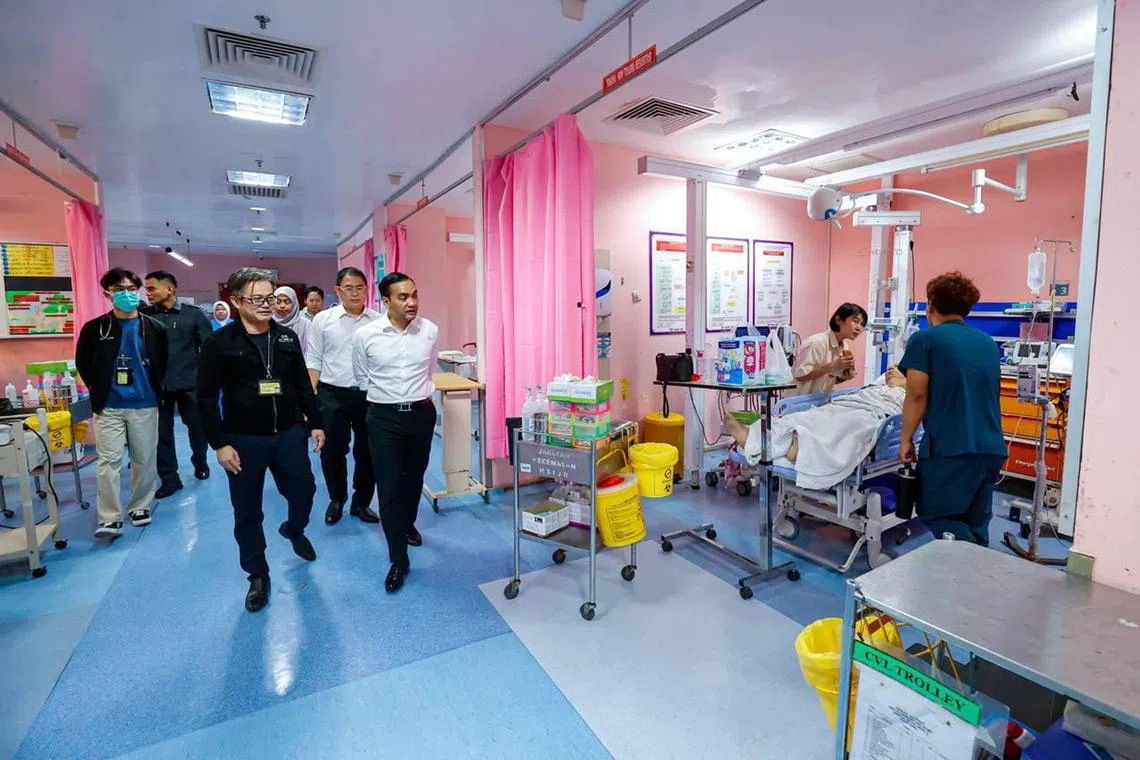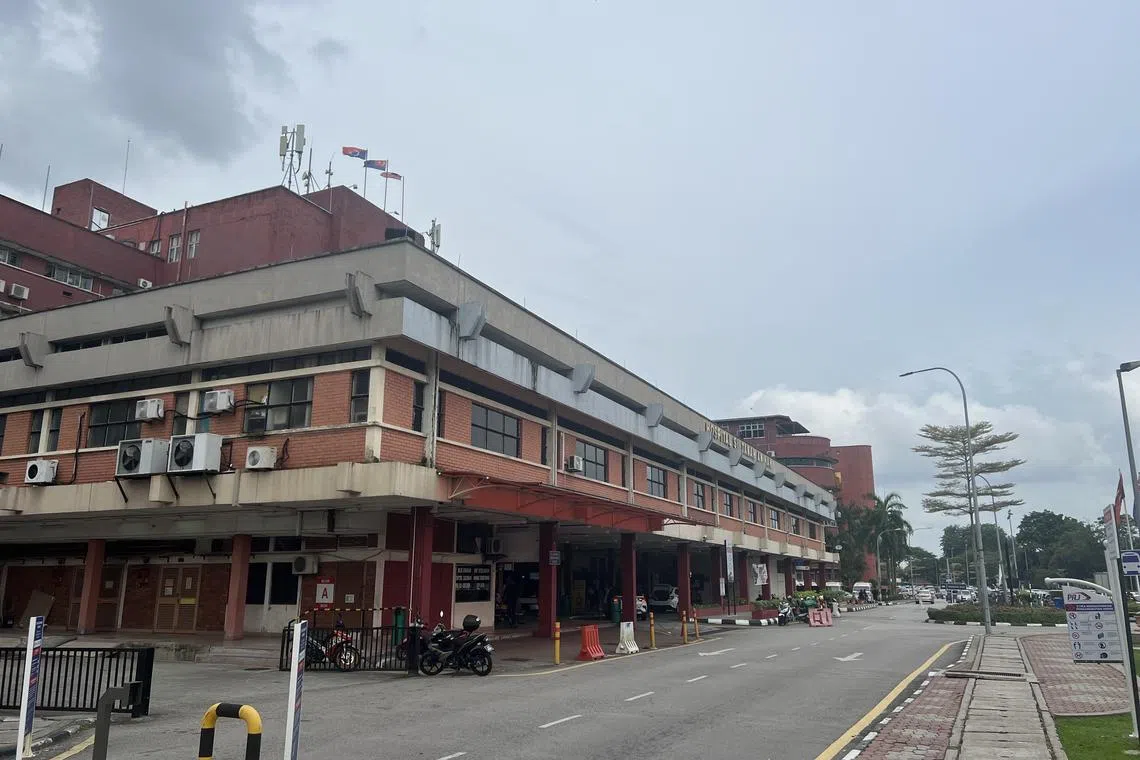Johor faces healthcare worker shortage amid population boom, pull of higher Singapore salaries
Sign up now: Get insights on the biggest stories in Malaysia

Johor Menteri Besar Onn Hafiz Ghazi (front right) during a visit to a government hospital on July 14.
PHOTO: ONN HAFIZ GHAZI/FACEBOOK
Follow topic:
- Johor faces a severe healthcare worker shortage, with staff overworked and facilities stretched due to population growth and Malaysians seeking better opportunities elsewhere.
- Hospitals operate beyond capacity; nurses handle up to 14 patients per shift, exceeding the ideal 6-8, impacting both staff well-being and patient care.
- Besides the Singapore factor, some countries in the Middle East also offer good pay for medical staff.
AI generated
JOHOR BAHRU – Cardiologist Ng Kim Fong worked long hours as a specialist at Johor Bahru’s main hospital, tending to around 100 patients a day for years.
His daily shifts, for five days a week, consisted of morning rounds serving up to 40 patients in the wards of Hospital Sultanah Aminah, and then tending up to 30 outpatients at the hospital’s clinic from noon. This would be followed by tending to another 30 or so patients in the wards before he could call it a day.
He switched to private practice in September 2024, after nearly two decades with the hospital.
“That was what we as government doctors had to do. It’s part of our job. But in recent years, the patient numbers have been increasing,” Dr Ng told The Straits Times.
He is now a consultant cardiologist at KPJ Kluang Specialist Hospital in the Kluang district, some 100km from Johor Bahru, and his pay has more than tripled.
“There is definitely a severe shortage of healthcare workers in Johor – especially staff nurses, medical officers and specialists,” he said, noting that public healthcare staff are overworked and overwhelmed.
The issue was spotlighted by Johor Menteri Besar Onn Hafiz Ghazi on July 14, when he said the state is facing a “critical and serious” shortage of healthcare officers in major government hospitals.
Doctors from the Johor Doctors Association told ST that more healthcare professionals are needed, as Malaysians from across the country move to the Johor capital city and its surrounding areas, which many use as a base for working in Singapore.
The migration to southern Johor districts is also due to the booming economy, leading to a wide availability of jobs for those not keen to work in Singapore.
Added to this is the longstanding issue of Malaysian nurses and doctors seeking jobs abroad, including in Singapore, for better salaries, said Johor’s top health official, Mr Ling Tian Soon, on July 10.
Datuk Onn, during a visit to a government hospital ward on July 14, said a nurse in Johor Bahru has to serve between 10 and 14 patients on every shift. Each nurse should ideally serve between six and eight patients, he added.
“The situation is not just unfair to our workers, but it is also not safe for our patients if we let this continue,” he said.
Mr Ling told ST that Johor needs at least 4,600 healthcare workers – including doctors, nurses and specialists – to meet local demand.
He added that a task force was formed with Malaysia’s Ministry of Health after a meeting with its minister, Dr Dzulkefly Ahmad, on July 15 in Putrajaya.
But, he said, the current 4,600 number might be just a short-term fix, as many more may be required.
“You hear about patients saying they have to sleep in waiting areas, and doctors needing to put extra beds in between the wards. This is happening because there are too many people and too few staff,” he told ST over the phone.
Mr Ling said the two main hospitals in Johor Bahru – Hospital Sultanah Aminah, which has 1,206 beds, and Hospital Sultan Ismail, which has 704 beds – are operating at 100 per cent to 110 per cent capacity each day.
“The actual number of healthcare workers needed in Johor may be more, taking into account the current population, so when we met the Ministry of Health, we told them to get the more than 4,000 (healthcare) positions ready first,” he explained.
Ministry of Health data shows that Johor has 12 public hospitals across its 10 main districts, providing more than 5,200 beds.
Hospital Pasir Gudang, a new RM500 million (S$150 million) project in Bandar Baru Seri Alam – about 14km east of Johor Bahru – was initially expected to begin operations in August, but this has been delayed to 2026.
Mr Ling said the 304-bed hospital needs 500 new staff members for its first phase of operations, but only 315 vacancies have been filled.
Johor has about 6,800 doctors and 10,800 nurses for its more than four million residents, or roughly one doctor per 600 people, according to publicly available data from the ministry in 2022.
The Malaysia-wide ratio is better, with one doctor per 412 people.

Johor Bahru's main hospital, Hospital Sultanah Aminah, is Malaysia's second busiest government hospital, serving more than 2,000 patients a day.
ST PHOTO: HARITH MUSTAFFA
Singapore, a developed nation offering high salaries, has an even lower doctor-to-population ratio of about one doctor per 353 people as at 2023.
“The morale among healthcare workers is at an all-time low,” said Johor Doctors Association president Mohamed Amin Kader.
“Johor has suffered far too long. Besides Johor Bahru, we have Batu Pahat, Muar, Kluang, Segamat, Pontian, Mersing, each with a big population that lacks healthcare workers, with some sub-specialists even covering the entire state or two to three districts,” added the internal medicine specialist from Pantai Hospital Batu Pahat, located about 120km from Johor Bahru.
Johor’s population was 3.6 million just 10 years ago, according to Malaysia’s department of statistics. This has jumped 11.1 per cent to 4.01 million today.
The Johor Bahru district, where the state capital sits, recorded some 1.8 million people in 2024, making it one of Malaysia’s biggest cities by population. In contrast, Kuala Lumpur has 2.06 million people and the Klang district in Selangor state has 1.17 million.
The Johor population surge compares with the slower rise of 9 per cent in Malaysia’s overall population to 34.2 million today from around 31.2 million 10 years ago.
The Regent of Johor, Tunku Ismail Idris Sultan Ibrahim, said on July 8 that he has called on the federal government to “expedite the approval and hiring process to fill vacancies” that are causing “significant congestion” in Johor’s hospitals.
During a recent visit by ST to Hospital Sultanah Aminah, patients complained to this paper about the long waiting times despite them having appointments, the lack of staff, the ageing equipment and even the shortage of chairs for those waiting.
In the hallway leading to the patients’ wards, caregivers were seen seated on the floor and on concrete kerbs holding their queue slips.
“I came to the clinic at 9am for an orthopaedic appointment for my broken finger, and we got out only at 3.30pm,” said Kulai resident Mohammad Amirul Johari, 30, who met with an accident while riding his motorcycle two weeks ago on the way home from work in Singapore.
The Singapore factor in attracting healthcare professionals is another issue that Johor, and the rest of Malaysia, has had to contend with over the years. Countries in the Middle East also offer good pay for medical staff.
Senator R.A. Lingeshwaran on July 8 was quoted in the Malaysian media as saying a recruitment agency had offered local doctors an annual package of $110,000 plus housing and other perks to work in Singapore.
Dr Lingeshwaran, a former director at a Penang hospital, said a Malaysian medical officer with three years’ experience earns a gross salary of only about RM72,000 (S$22,000) a year.
Former public dentist Choudhry Sundaram Padiachee told ST: “Low salaries, overworked staff, bad work culture and a lack of clear career prospects are among the reasons why I left, and why, I believe, many have left and are leaving.”
Dr Choudhry, who worked in Hospital Sultan Ismail for nine years, now runs Habib Dental in Bandar Dato Onn, a suburb 12km north of Johor Bahru.


